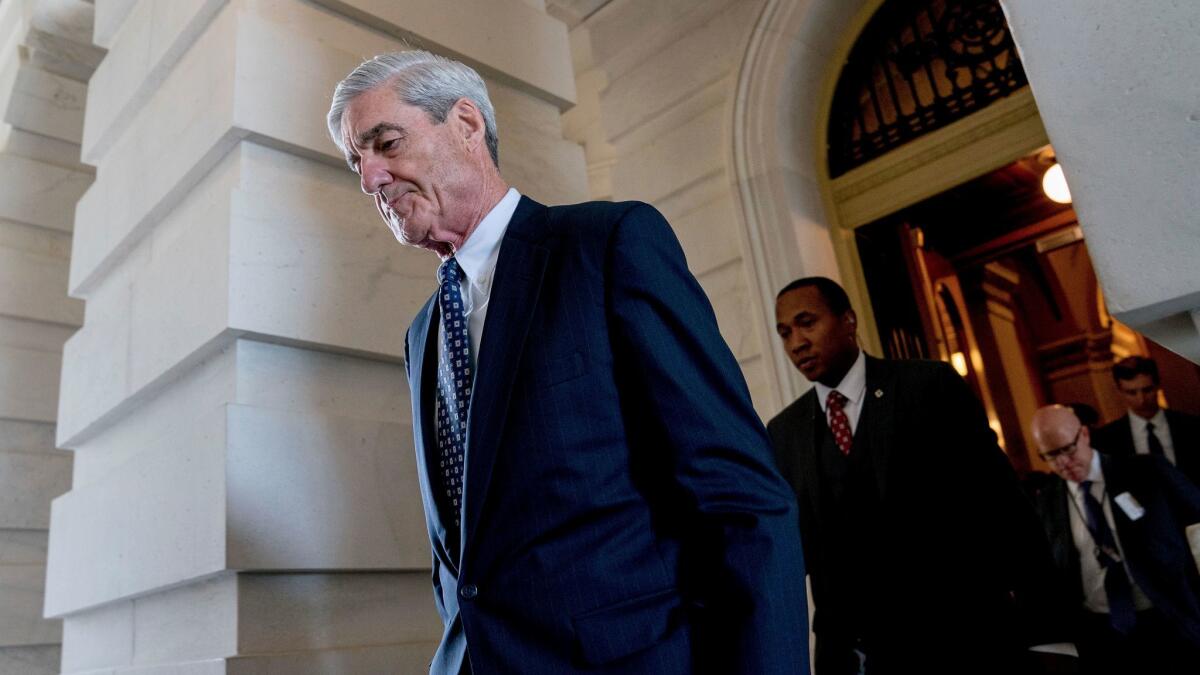Newsletter: What happens when Trump says ‘you’re fired’ to Mueller?

Good morning. I’m Paul Thornton, and it is Saturday, Sept. 23, 2017. If you’re reading this newsletter, the world did not end today as prophesied. Let’s take a look back at the week in Opinion.
It might be baffling to some that
So, what happens then? Impeachment? Removal? Litman predicts something far less cathartic for his opponents, but much more dangerous to our democracy:
Mueller could launch a legal challenge to the ouster (potentially with the support of the Department of Justice). It’s by no means clear that Mueller, an ex-Marine of legendary rectitude, would choose to sue. Assuming he did, though, he would need to overcome a series of constitutional arguments by the president’s lawyers that any restrictions on the president’s ability to terminate him would impinge on presidential power under Article II.
In any event, any pushback from the courts would likely be procedural and incremental. Only Congress is positioned to pass broad judgment on Trump. But a congressional response — for example, a statute to create an independent counsel — would be tempered by political compromise, and would have to withstand a presidential veto. In particular, it’s hard to envision a scenario in which Congress successfully forced Trump to reinstate Mueller.
As for a more definitive rebuke such as impeachment, for now it is a barely conceivable fantasy. Even if
Democrats were to gain control of the House in the 2018 elections, chances are remote that Democrats in the Senate would be able to muster the 67 votes needed to convict and remove. The trial would be a sort of opéra bouffe with Trump at the center at his most melodramatic. And when Trump is acquitted, he will find a cheap salesman’s way to declare victory, to the exasperation of his critics.Impeachment without removal, then, looks to be the worst-case scenario for Trump. He’ll still get away with firing Mueller, but expect him not to run for a second term. Expect him also to be a fixture on, and probably atop, lists of the nation’s worst presidents.
Still, once Trump is out of office, and assuming he hasn’t left visible wreckage beyond an ousted independent counsel, can we then count ourselves lucky and move on from the misadventure?
Meanwhile, Trump name-called and threatened to annihilate another country. Columnist
L.A. and Mexico City have a lot in common — they’re both big, and they both shake. Watching clips of the 7.1-magnitude earthquake in Mexico City, with desperate residents fleeing collapsing structures and others clinging onto the legs of life-saving tables as the room around them shakes, reminds editorial writer Mariel Garza that she and others in Los Angeles will one day find themselves in the same grave situation. The Times Editorial Board warns of the effects on Los Angeles of a similarly powerful temblor: “An earthquake of 7.1 or higher could leave you alive but stuck in a paralyzed community without power, water, functioning roadways and aqueducts, and Whole Foods. First responders could be a couple of days from getting to you.”
Republicans once again tried to take
Are you expressing concerns about the cost of a single-payer healthcare system? Then you’re a troll, according to Adam H. Johnson: “Others claim they support universal healthcare in theory (one day, perhaps), but cannot do so now because of a ‘concern.’ They are ‘concern trolls’ — broadly defined as ‘a person who disingenuously expresses concern about an issue with the intention of undermining or derailing genuine discussion.’” L.A. Times
“Free Speech Week” at UC Berkeley might have been a farce all along. Apparently, before announcing their multi-day rally scheduled for next week, right-wing provocateur
Fight climate change. Just don’t touch our cars. The editorial board scolds motorists for effectively thwarting efforts throughout the state to significantly reduce California’s carbon footprint: “Any effort that limits, constrains or makes driving one’s car more expensive or inconvenient — no matter how civic-minded the proposal — is immediately controversial in California, and often a nonstarter. Getting between Californians and their cars can spell the end of a political career. Just ask former Gov. Gray Davis, who was recalled in large part because of his decision to triple the state’s vehicle license fee.” L.A. Times
Reach me: paul.thornton@latimes.com
Get the L.A. Times Politics newsletter
Deeply reported insights into legislation, politics and policy from Sacramento, Washington and beyond. In your inbox three times per week.
You may occasionally receive promotional content from the Los Angeles Times.




